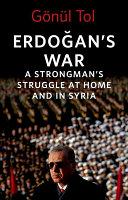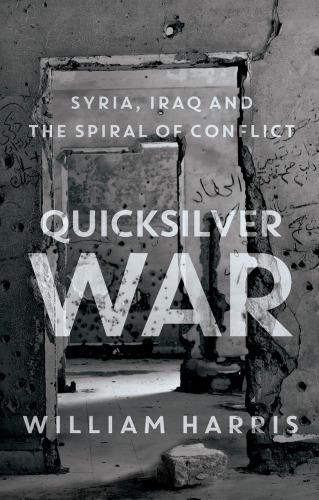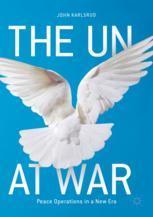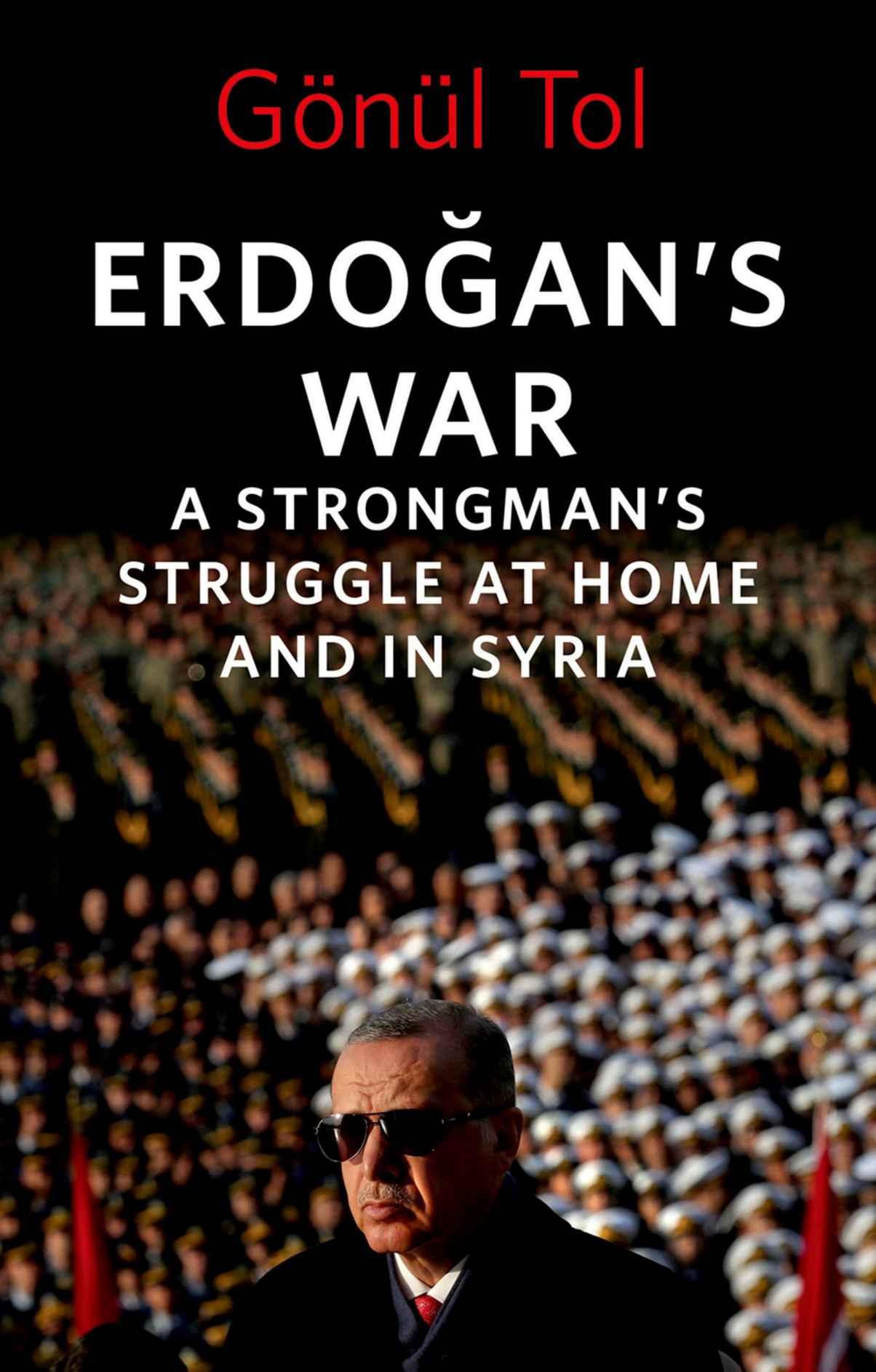Erdogan's
War: A Strongman's Struggle at Home and in Syria Tol
Visit to download the full and correct content document: https://ebookmass.com/product/erdogans-war-a-strongmans-struggle-at-home-and-in -syria-tol/
More products digital (pdf, epub, mobi) instant download maybe you interests ...
Quicksilver War: Syria, Iraq and the Spiral of Conflict
William Harris
https://ebookmass.com/product/quicksilver-war-syria-iraq-and-thespiral-of-conflict-william-harris/
Christmas at Home Carolyn Brown
https://ebookmass.com/product/christmas-at-home-carolyn-brown/
Christmas at Home Carolyn Brown
https://ebookmass.com/product/christmas-at-home-carolyn-brown-5/
Christmas at Home Carolyn Brown
https://ebookmass.com/product/christmas-at-home-carolyn-brown-6/
Christmas at Home Carolyn Brown
https://ebookmass.com/product/christmas-at-home-carolyn-brown-4/
Christmas at Home Carolyn Brown
https://ebookmass.com/product/christmas-at-home-carolyn-brown-2/
Christmas at Home Carolyn Brown
https://ebookmass.com/product/christmas-at-home-carolyn-brown-3/
Florence Nightingale at Home Paul Crawford
https://ebookmass.com/product/florence-nightingale-at-home-paulcrawford/
The UN at War: Peace Operations in a New Era 1st Edition John Karlsrud (Auth.)
https://ebookmass.com/product/the-un-at-war-peace-operations-ina-new-era-1st-edition-john-karlsrud-auth/
‘This astute book masterfully explains how Erdoğan’s plans to exploit the Syrian war for his own ends have perverted Turkish domestic politics, plunged his country further into authoritarianism, and changed the course of history. A fascinating, instructive and ultimately powerful cautionary tale.’
Fiona Hill, former Deputy Assistant to the U.S. President, and author of There Is Nothing for You Here
‘Superbly narrates the tragic intersection of Syria’s civil war and Turkey’s ravenously ambitious president. Politicians clung to power in Damascus and Ankara, but “Erdoğan’s War” helped shatter Syria and undermined what had been an aspiring Turkish democracy. A sad story, very ably told.’
David Ignatius, columnist, The Washington Post
‘Early in Syria’s peaceful uprising, Turkish officials were alarmed by Assad’s brutal survival tactics, and perplexed by his turning from Turkey’s friendly leader. But Syria and Syrians became props for Erdoğan’s ownpolitical survival. This is a fascinating story, and no one tells it better than Tol.’
Frederic C. Hof, former U.S. Special Envoy to Syria
‘A timely and insightful examination of Erdoğan’s project and its geostrategic implications. Well-written, richly informed and powerfully argued, this is a mustread for anyone interested in Turkey today, or in how strongman politics and great power ambitions are changing countries and the world order.’
Vali Nasr, Majid Khadduri Professor of Middle East Studies and International Affairs, Johns Hopkins University
‘A compelling, richly researched picture of Erdoğan as a populist, not an Islamist a political chameleon with an uncanny sense for power. Tol’s clear writing makes sense of Turkey’s role in Syria’s catastrophic war, its slide into authoritarianism, and where it might be going.’
Marc Lynch, Professor of Political Science and International Affairs, The George Washington University
‘Expertly traces Turkish decisions and actions in the Syria conflict, providing unique context as we consider NATO’s role post-Ukraine. Tol’s dissection of Turkey under Erdoğan’s unique leadership will help future generations of military and diplomatic leaders understand this critical, but frequently frustrating, NATO ally.’
Gen. Joseph L. Votel (Ret.), commander of U.S. Central Command 2016–19
‘A compelling narrative that unveils Erdoğan’s unique chameleon-like qualities through the lens of the Syrian war. By connecting Erdoğan’s domestic strategy with his controversial foreign policy, Tol provides a treasure trove of knowledge, information and insight for future historians.’
Cengiz Çandar, award-winning journalist and former advisor to President Turgut Özal
‘A sharp and penetrating analysis of Turkey’s transformation under Recep Tayyip Erdoğan, and of foreign policy’s role in that process. A very well-written and engaging book that covers everything you need to know to understand today’s Turkey.’
Yaşar Yakış, former Turkish Minister of Foreign Affairs
CONTENTS
Acknowledgements
ListofAbbreviations
Introduction
1. Erdoğan’s Strategy Towards Hegemony
2. Erdoğan Turns to Islam
3. The Syrian Gambit: Assad Must Go
4. From Religion to Nationalism
5. Attacking Kurds Trumps Toppling Assad
6. Erdoğan’s Nationalist Gamble Backfires
7. Syrians Must Go
Conclusion
Notes
Index
ACKNOWLEDGEMENTS
Writing this book has been an exercise in juggling a career and motherhood under Covid-19. Like millions of working mothers, I often felt that I failed at both. I was lucky to have the support of my husband, Ömer Taşpınar, who convinced me otherwise. From reading the draft to giving me advice on the title to keeping our little son occupied so I could write, he was as important to finishing this book as I was. I thank him for that. I am also thankful to my son, Kerem, who has brought immense joy and happiness into my life. He inspired me to pay closer attention to the suffering of refugee children and how much a parent can sacrifice for their kids. Special thanks go to my parents and my siblings for putting up with me over the years it has taken to finish this book.
My heartfelt appreciation goes to Lisel Hintz, who contributed her time and expertise to this book when I most needed help. She is not only a brilliant Turkey scholar and a meticulous editor but also a wonderful friend. I will forever remain indebted. There is a long list of colleagues and friends to whom I owe a debt of gratitude. Foremost among them is Cengiz Çandar. I have not only relied on his work during the course of writing this book but was also inspired by the attention to detail in his writings. I am grateful to him for encouraging me when I had doubts, reading the draft and giving me valuable feedback. I would also like to thank John F. Stack Jr for
being an incredible mentor and friend who has always supported my work.
My thanks are extended to Christopher Phillips, Meliha Altunışık, İlhan Uzgel, Brian Katulis and Bilal Saab who all read and commented on the draft. I have greatly benefited from my interviews and conversations with Ali Yaycıoğlu, Ruşen Çakır, Menderes Çınar, Ali Balcı, General Joseph L. Votel (ret.), Yaşar Yakış, Ertuğrul Kürkçü and Samir Aita. I would like to express my gratitude to the President of the Middle East Institute, Paul Salem, who has shared my enthusiasm for this book and put up with my distractions during the course of writing it. Huge thanks to those who took the time, and at times the risk, to talk to me candidly about sensitive issues while I was researching for the book. I am forever grateful for the opportunities they afforded me to get a nuanced understanding of complicated matters. I am also indebted to the two anonymous reviewers for their feedback. Their suggestions have made the book stronger. Last but not least, I would like to extend my sincerest gratitude to our brilliant, hard-working interns at the Middle East Institute, Hannah Kim, Gülşen Doğan and Danielle Cohen, for their help with the references.
LIST OF ABBREVIATIONS
AFAD Turkey’s Disaster and Emergency Management Authority (Afet ve Acil Durum Yönetimi Başkanlığı)
AKP Justice and Development Party (Adalet ve Kalkınma Partisi)
ANAP Motherland Party (Anavatan Partisi)
AQI al-Qaeda in Iraq
COI Commission of Inquiry for Syria
COMCEC Standing Committee for Economic and Commercial Cooperation
DP Democrat Party
DTP Democratic Society Party (Demokratik Toplum Partisi)
ECHR European Court of Human Rights
ESZ Euphrates Shield Zone
FJP Freedom and Justice Party
FSA Free Syrian Army
GAP The Southeast Anatolia Development Project (Güneydoğu Anadolu Projesi)
GNA Government of National Accord
HDP Peoples’ Democratic Party (Halkların Demokratik Partisi)
HRW Human Rights Watch
HSYK Supreme Board of Judges and Prosecutors (Hakimler ve Savcılar Yüksek Kurulu)
HTS Hayat Tahrir al-Sham
İHO Imam Hatip schools (İmam Hatip Okulları)
IRCICA Research Centre for Islamic History, Art and Culture (İslam Tarih, Sanat ve Kültür Araştırma Merkezi)
ISI Islamic State in Iraq
ISIS Islamic State of Iraq and Syria
JCP Justice and Construction Party
JFS Jabhat Fateh al-Sham
KCK Kurdistan Communities Union (Koma Civakên Kurdistanê)
MBZ Mohammed bin Zayed
MHP Nationalist Movement Party (Milliyetçi Hareket Partisi)
MİT Turkish Intelligence Agency (Milli İstihbarat Teşkilatı)
MP Motherland Party
MÜSİAD Association of Independent Industrialists and Businessmen (Müstakil Sanayici ve İşadamları Derneği)
NSC National Security Council
NSP National Salvation Party
NSPD National Security Policy Department
PYD Democratic Union Party (Partiya Yekîtiya Demokrat)
RTÜK Radio and Television Supreme Council (Radyo ve Televizyon Üst Kurulu)
SDF Syrian Democratic Forces
SEEs State economic enterprises
SESRIC Statistical, Economic and Social Training Centre for Islamic Countries
SMEs Small- and medium-sized enterprises
SNA Syrian National Army
SNC Syrian National Council
TİKA Turkish Cooperation and Coordination Agency (Türk İşbirliği ve Koordinasyon İdaresi Başkanlığı)
TIS Turkish-Islamic Synthesis
TMSF Turkish Government’s Savings Deposit Insurance Fund (Tasarruf Mevduatı Sigorta Fonu)
TOKİ Turkey’s Mass Housing Administration (Toplu Konut İdaresi Başkanlığı)
TPP True Path Party
TSK Turkish Armed Forces (Türk Silahlı Kuvvetleri)
TÜGVA The Service for Youth and Education Foundation of Turkey (Türkiye Gençlik Vakfı)
TÜRGEV Turkish Foundation to Serve the Youth and Education (Türkiye Gençlik ve Eğitime Hizmet Vakfı)
TÜSİAD Association of Turkish Industrialists and Businessmen (Türk Sanayicileri ve İş Adamları Derneği)
TUSKON Confederation of Turkish Businessmen and Industralists (Türkiye İşadamları ve Sanayiciler Konfederasyonu)
UNSC United Nations Security Council
VP Virtue Party (Fazilet Partisi)
WP Welfare Party (Refah Partisi)
YÖK The Council of Higher Education (Yüksek Öğretim Kurulu)
INTRODUCTION
“Once an Islamist, always an Islamist,” said a Western diplomat of Turkey’s then Prime Minister Recep Tayyip Erdoğan. We were sitting in a Washington café in the fall of 2012, a few days after Erdoğan unveiled what many called his “Islamist manifesto” at his party’s congress. Islamists from the region were guests of honor at the event. Hamas leader Khaled Meshaal stood next to the Egyptian Muslim Brotherhood’s newly elected President Mohammed Morsi who delivered a speech thanking Erdoğan for his support during the uprising that toppled the autocrat Hosni Mubarak.
The ruling party’s congress took place against the background of a watershed moment in the history of the Arab world. A wave of popular uprisings was ousting long-time autocrats and paving the way for the rise of Islamists. Erdoğan had thrown his full support behind them. This was in stark contrast to his previous policies. After the Justice and Development Party (Adalet ve Kalkınma Partisi—AKP) was founded in 2001, Erdoğan declared that he had broken with his Islamist past. In his first two terms in office, he refrained from interfering in the domestic affairs of regional countries and cultivated friendly ties with Arab autocrats—backing forces arrayed against autocratic regimes was a dramatic volte-face. The diplomat I was sitting with in that café did not think Erdoğan had changed at all. “I never believed Erdoğan when he said he was no longer an Islamist,” he said. “Turkey’s decision not to participate in the 2003 Iraq war
proved me right. It was Erdoğan the Islamist’s first step in crafting an Islamist foreign policy and turning Turkey away from the West.”
I heard similar comments from Western officials and Turkish secularists who often worried about what they saw as Erdoğan’s problematic foreign policy behavior or his authoritarian approach. To many of his critics, from the day he came to power until his twentieth year at the helm, the culprit behind everything wrong with Erdoğan’s Turkey has always been the same: his Islamist ideology. There are two underpinning assumptions behind this thinking. The first is that ideology, Islamist ideology in particular, is an unchanging, constant force in the life of a politician. The second is that Erdoğan’s Islamist ideology is the key driver of the country’s authoritarian turn and his controversial foreign policy moves. I find these assumptions problematic. Thinking that a politician can have one and only one point of view throughout their entire political career would be assuming too much. Like any other politician, Erdoğan’s number one goal is to stay in power and he is ready to employ whatever ideology serves that goal best. He is first and foremost a populist, a term that will be explained in the following pages. He pairs his populism with different ideologies and Islamism is only one of them. Therefore, I argue that Islamism is not the chief reason for the country’s degeneration into autocracy or Turkey’s troublesome foreign policy under Erdoğan. It is only one of many factors that have taken Turkey to where it is now, and foreign policy has played a more complicated part in that process than has been accounted for. I believe not enough attention has been given to the function of foreign policy in the country’s authoritarian transformation. The aim of this book is to shed light on that role by expounding how the war in Syria helped Erdoğan defeat his opponents and build an authoritarian regime.
What is apopulist?
Ideologies are often seen by political actors as an instrument to generate consent for their agenda. They might be shaped and
transformed to fit politicians’ survival strategies. What makes Erdoğan unique is his adeptness in adopting different, sometimes conflicting, ideologies with great ease. Throughout his many years in office, he has utilized a variety of ideological outlooks, from conservative democracy to Islamism and nationalism, to eliminate his rivals and consolidate power. The historical rifts between Turkey’s ethnic and religious minorities and the Turkish-speaking Sunni Muslim majority, and between the secular and religious sectors of the country, allowed Erdoğan to leap from one ideology to another to mobilize support for his agenda.
While the ideologies Erdoğan employed changed, one thing has remained constant during the two decades he has been in power. Erdoğan has always been a populist. There is much confusion about what a populist is. The most widely accepted definition is that populists frame politics as a war between the virtuous, ordinary masses and a corrupt elite.1 Populists define who the “real people” are and claim that they alone represent “the people.” “The people” can take many forms including race, ethnicity and religion. Politicians may use populism as a political style to attack the establishment, polarize society and claim moral superiority. However, populism itself does not offer a holistic view of how society, politics and the economy should be ordered, therefore populists usually pair it with ideologies to provide substance to their populist style. The ideological flexibility that populism offers allows populists to exploit broad issues such as nationalism, religion or ethnicity and strategically change their ideological outlooks to fit their goals.2
Since he came to power, Erdoğan has utilized populism to ensure his political survival. Although the populist discourse was less pronounced in his early years in office, he used populist rhetoric to appeal to the country’s marginalized segments including nonsecular practicing Muslims, Kurds, Alevis and other ethnic and religious minorities. These groups were alienated by the country’s elitist founding ideology, Kemalism, which sought to establish a secular, modern, nation-state out of the multinational Ottoman Empire. Erdoğan sought to appeal to these marginalized groups by
employing an anti-elitist narrative, presenting himself as “of the people” and a true democrat who speaks on behalf of the masses. His definition of “the people” changed depending on the ideological outlook he chose to attach to his populist style. During the AKP’s first two terms in office, Erdoğan advocated democracy and human rights to sideline the secularist establishment, particularly the military. He disavowed his Islamist past and described his AKP as “conservative democratic.” He presented curbing the secularist establishment’s power as taking the state from the elites and handing it over to “the people,” who were kept out of the corridors of power by the secularist elite.
After he reined in the secularist military, he employed Islamist populism to establish an executive presidency. Erdoğan defined “the people” as the “oppressed Muslims,” the ummah(the community of believers), united against an “unjust, immoral West” and its domestic collaborators. When Islamist populism failed to secure enough support for a presidential system that would grant Erdoğan unchecked powers, he switched tactics and paired his populism with Turkish nationalism, which promotes ethnic Turkishness at the expense of other ethnic groups, primarily the Kurds. “The people” became those who subscribed to Turkish nationalism’s claims and backed Erdoğan’s autocratic vision. Kurds, who sought recognition of their ethnic identity, and everyone else who opposed granting Erdoğan unchecked powers were defined as “terrorists,” “traitors” and an “enemy of the people.”
Foreign policy has been key in substantiating these ideological outlooks. To Erdoğan, foreign policy has never been primarily about the international pushes and pulls. It has been first and foremost about his domestic strategy to keep his grip on the country. Foreign policy serves as the medium through which his chosen ideology is expressed and reproduced. In other words, foreign policy has helped Erdoğan tell the voters what he stands for and how he imagines the national identity.3 Erdoğan has used foreign policy not only to construct his identity but also as a vehicle to divide and eliminate his rivals and consolidate his base.4 Thus, foreign policy has been part
and parcel of his war against his domestic opponents. In particular, Syria has played a unique role in Erdoğan’s political survival strategy. This book is an attempt to shed light on that role.
What is the bookabout?
Recep Tayyip Erdoğan has become Turkey’s longest-serving leader. On his way to the top, he has fought many battles. This book tells the story of those conflicts against his domestic enemies through the lens of the Syrian war, which became critical in his battle to remain in power. It traces Erdoğan’s transformation from a “conservative democrat” into an Islamist and a Turkish nationalist and how this transformation has come to shape his policy on Syria. Highlighted is Erdoğan’s constantly shifting strategy to consolidate his rule and how these shifts transformed Turkey’s role in post-uprising Syria from an “advocate of democracy” to a country fanning the flames of civil war, to an “occupier.” From the first days of Erdoğan’s rule through to failed coup that attempted to topple him; the Kurdish peace process; Arab uprisings and the refugee crisis, this is the tale of how one man’s quest to remain in power has tied together the fate of two countries and changed them forever.
One might ask: why focus on one man to tell the story of a country’s transformation, especially if that country is Turkey, which was once considered to be a “beacon of democratic consolidation in a volatile neighborhood”? Why treat Erdoğan as a semi-God or a sultan whose choices single-handedly determined the fate of Turkey? Are there no other factors such as the country’s institutions, its political culture, competing constituencies, even external actors such as the European Union, of which Turkey has been trying to become a member for decades, that need to be factored in? There are indeed actors other than Erdoğan who have played important roles in Turkey’s transformation in the last two decades. This book tells the story of Erdoğan’s war against those actors and how he managed to win many battles. It does not treat Erdoğan as a sultan who acted in an unrestrained political environment to single-
handedly determine the fate of the country. On the contrary, the narrative tries to show how Erdoğan had to operate in a setting that constrained the means available to him to realize his goals. One of the tools he has used quite effectively has been foreign policy. The steps he has taken on that front have helped him undermine his opponents and centralize power.
The main argument of the book is that it is not Erdoğan’s Islamist ideology that has been the main catalyst in Turkey’s authoritarian turn. Erdoğan is not an ideologue. He is a political chameleon, constantly changing colors to survive. Multiple factors have contributed to the country’s authoritarian turn. This book focuses on the significance of foreign policy in that transformation and argues that post-war Syria occupies a unique place in Erdoğan’s efforts to consolidate his authoritarian grip on the country.
Asynopsis
When Erdoğan’s ruling AKP first came to power in 2002, his chief rival was the military. As the secularist Republic’s self-appointed guardians, the military had often intervened in politics, forcing the country’s first Islamist prime minister to resign and paving the way for the Islamist parties’ closure. The fate of previous Islamist parties had taught Erdoğan a valuable lesson—that one had to avoid direct confrontation with the military to survive politically. Instead of pursuing a direct clash, Erdoğan sought to sideline the military by adopting a pro-European Union stance which called for a pro-reform agenda at home. The EU was a natural ally for Erdoğan in his search for protection against the secularist establishment. It had already set curbing the military’s influence in politics as a precondition for Turkey’s entry into the Union and further democratization that would come with EU membership would automatically address issues important to Erdoğan’s conservative base, such as the headscarf ban.
To appeal to skeptical constituencies whose support was important to constraining the military’s power, Erdoğan disavowed
his Islamist past, recast the AKP as a pro-Western “conservative democratic party” that was committed to the secular principles of the constitution and pushed forward Turkey’s objective of EU membership. He declared that winning EU membership for Turkey and implementing democratic reforms were his top policy priorities. By pursuing membership in an organization that was rejected as a “Christian club” by the country’s Islamists, Erdoğan signaled to the liberal and secular segments of the country that he was no longer an Islamist. The pro-EU agenda helped Erdoğan construct his identity as a conservative democratic leader whose number one goal was to make Turkey a “true democracy.” He cast himself as the voice of the masses neglected by the privileged elite and branded his secularist opponents in politics and bureaucracy, who were skeptical about his pro-EU agenda, as obstacles to Turkey’s democratization.
In the Middle East, Erdoğan pursued a pragmatic, cautious, prostatus quo policy. Like the pro-EU agenda, Erdoğan’s pre-Arab uprisings Middle East policy was part of his strategy to win the war against the military without engaging in a fierce fight that could destroy his political future. This policy, which was dubbed the “zero problems with neighbors” policy, sought to cultivate close ties with regional countries using trade and investment as the primary drivers, but avoiding interference in their domestic affairs. It was both an offensive and a defensive move against the military. It was defensive in that it tried to avoid a secularist backlash by pursuing a policy that was largely in line with the military’s pro-status quo stance vis-à-vis the region, and tried not to cross the military’s “identity redlines” as the fight against Islamism and Kurdish separatism.5 It was offensive because by cultivating close ties to regional countries, Erdoğan hoped to diminish the military’s role in politics. For decades, the narrative that Turkey was surrounded by hostile countries legitimized the military’s oversized sway in politics. With a “zero problems with neighbors” policy, the Erdoğan government wanted to challenge that narrative and limit the military’s role in political decision-making by desecuritizing Turkey’s Middle East policy.
Pre-war Syria became the place where Erdoğan tested out this policy. He cozied up to an “infidel regime” that had carried out the Hama massacre against thousands of Muslim Brotherhood members in the 1980s to quell an Islamic uprising. The Hama massacre remained etched in the memories of Turkish Islamists, including Erdoğan, but he put that aside to make Syria the success case of his new foreign policy outlook.
The pro-EU stance Erdoğan embraced earlier in his tenure and his zero problems with neighbors policy facilitated his efforts to sideline the secularists. This foreign policy line helped him construct his image as a leader who had put Islamism behind him and solidify his alliance against the military’s influence in domestic and foreign policies. Erdoğan’s strategy worked brilliantly. It allowed him to wrap his power grab in a pro-reform, pro-EU language and a noble cause seeking zero problems with neighbors. By the time uprisings spread across much of the Arab world in 2011, Erdoğan had defeated the military and monopolized power in his own hands.
Erdoğan’s next target was grabbing unrestrained power by replacing the country’s parliamentary system with an all-powerful executive presidency. However, he would not be able to justify establishing what was practically a one-man rule with the conservative democratic brand. Nor would the pro-democracy coalition he mobilized early in his tenure rally behind such a project. Erdoğan decided to rely on the country’s religiously conservative segments and the Kurds. To appeal to them, he embraced an Islamist populist agenda. One of the key pillars of that agenda was constructing a national identity that gave primacy to Sunni Muslimhood and the Ottoman legacy. This formulation gave Erdoğan room to appeal to the Kurds as well. Stressing common Islamic ties legitimized his efforts to find a peaceful resolution to the Kurdish problem. Despite the initial progress on the Kurdish front, Erdoğan’s post-2011 strategy led to a majoritarian understanding of democracy in which the Sunni Muslim majority that backed Erdoğan was entitled to primacy and the rest were considered “the enemy of the people.”
A clarification is warranted here. Erdoğan adopted a “thin” understanding of Islamism after he sidelined the secularist
establishment. The steps he took after 2011 were not a systematic attempt to change the secular nature of the state. Rather, they were superficial displays of religiosity to legitimize his efforts to secure unprecedented powers. It is necessary to provide a precise definition of Islamism here—but it is equally difficult to offer one. There are many disparate groups considered to be Islamist. Their aims, objectives and interpretations of Islamic tradition and practice vary widely. But in the broadest sense, Islamists define Islam not just as a religion but also as a political ideology and think that Islam should play a key role in the way politics is conducted, law is applied and society is organized. Erdoğan took steps to increase the visibility of Islam in the public space. He assigned to Islam a central place in the country’s national identity and took further measures such as Islamizing the national curriculum and filling Turkish bureaucracy with followers of religious orders. He thereby reversed some of the symbolic tenets of Turkey’s historical practice of secularism. Yet those moves have not amounted to a radical transformation of the state’s relationship with Islam. Erdoğan’s goal was to generate support from conservative segments of the country for his power grab, not establish Islamic governance.
Erdoğan’s Islamist populist domestic agenda translated into a foreign policy that advocated Muslim unity and alliance with other Islamists globally. Like his domestic, Islam-flavored agenda, his proIslamist foreign policy remained “thin” without a coherent plan. Erdoğan’s shift from a populist with a self-identified conservative democratic brand to an Islamist populist radically changed his country’s alliances. Ankara’s support for Arab Islamists during the uprisings strained its relations with the regimes Erdoğan had cultivated close relations with, particularly in the Gulf. But Erdoğan’s volte-face was not part of a well-thought out, coherent, broader project to establish a new regional order. The main aim of his regional policies was to consolidate his rule. He wanted to capitalize on the Arab uprisings to reinforce the boundaries he had drawn at home, between those who backed his plan to establish a one-man rule and those who did not. To Erdoğan, real democracy meant the rise of Islamic identity against the culturally alienated, Westernized
elite. In his mind, Turkey under his watch was a shining example of this democratic awakening where the “true representatives” of the pious masses came to power through elections and ended the reign of “internal colonizers.” Only those who shared his conservative Islamic values belonged to the nation. Those who were opposed to him were called domestic foes, allies of the West and the enemies of true democracy and the will of the people.
Erdoğan framed his support for the Arab Islamists seeking to topple autocratic regimes as support given to a similar transformation in the region. In his narrative, just like in Turkey, the “true Muslims” would bring down “illegitimate,” Westernized, “Godless” regimes and establish real democracies. Turkey could spearhead that transformation and become the leader of the Muslim world. This is what he said to his followers. It was the perfect upbeat message at a time when Erdoğan sought more powers to complete his historical mission of leading Turkey to greatness. This ambitious narrative, however, was divorced from the policies he pursued. Despite his strong support of the Islamists trying to overthrow the regimes in Egypt and Syria, he did not uniformly back the anti-regime protests in the region. In Bahrain, for instance, in an effort not to alienate the Saudis, Turkey refrained from supporting the uprising. Nor did Erdoğan have a vision to help the transition to democracy of countries experiencing popular protests beyond supporting the Islamists.
Once again, Syria came in handy to bolster Erdoğan’s efforts to realize his domestic goals. Shortly after the popular protests erupted in the neighboring country, Erdoğan, who assumed that the Islamist wave that had swept across Egypt and Tunisia would swiftly bring the Islamists in power in Syria too, threw his support behind the Islamist elements within the opposition to topple the man he once called “brother.” Turkey became a base and supplier of arms to the rebels, including radical groups. Erdoğan’s actions fanned the flames of civil war and bolstered the jihadis within opposition ranks. His actions in post-war Syria had devastating implications for that country, but they offered Erdoğan an opportunity to burnish his Islamist credentials to appeal to conservatives at home and
delegitimize the secularist main opposition party. He often drew parallels between himself and those seeking to oust Assad and equated Turkey’s secularist main opposition party to the Baathist Assad regime, which he said had oppressed pious Sunni masses for decades.
When Erdoğan’s strategy of using Islam to secure the backing of pious Turks and Kurds for the executive presidency failed, largely due to the Kurds’ reluctance to support it, Erdoğan changed his plans again. This time, he turned to Turkish nationalism. After the pro-Kurdish party’s strong showing denied Erdoğan’s party a parliamentary majority in the 2015 elections, he cultivated an alliance with nationalists who view the Kurds as the biggest threat to the country’s territorial integrity. He fused anti-elite rhetoric with nationalist appeals to launch a war against the Kurds to consolidate his nationalist alliance. Erdoğan not only targeted the Kurdish militants who have been waging an insurgency against the Turkish state for decades but also the democratically elected Kurdish politicians and Kurdish civil society. The war against the Kurds paid off. It secured the nationalists’ backing for the executive presidency and helped Erdoğan establish his one-man rule.
Once again, Syria was crucial in advancing Erdoğan’s domestic agenda. After his nationalist turn, Erdoğan recalibrated his Syria policy. Toppling the Assad regime took a back seat to curbing Kurdish gains in northern Syria. Ankara began working with Damascus to secure the regime’s acquiescence for the military incursions it launched against the Syrian Kurds. Turkey’s military incursions helped Erdoğan boost his nationalist credentials and consolidate his anti-Kurdish alliance at home. Syria was not only a battleground where Erdoğan fought his domestic enemies. The civil war there also provided him with ammunition for his domestic fight against the Kurds and everyone else who was opposed to his oneman rule. The de facto autonomy the Syrian Kurds gained and their rise as key players in the US-led fight against ISIS helped Erdoğan feed nationalist anxieties by framing the Kurds, and those who would stand by them, as the biggest existential threat to Turkish
territorial integrity. It facilitated his efforts to criminalize legitimate Kurdish opposition and drive a wedge between his opponents. Playing the nationalism card did wonders for Erdoğan. Thanks to his alliance with the nationalists, he was able to grab unprecedented powers. Erdoğan’s anti-Kurdish alliance received its biggest boost from the war in Syria. But, there came a time when nationalism turned against Erdoğan and the war in Syria became a liability. In 2019, Erdoğan’s party lost mayoral elections in almost all big cities in the country. The growing nationalist backlash against the millions of Syrian refugees was second only to economic problems in bringing about the AKP’s poor performance. Election results showed that the nationalism Erdoğan had advanced for many years had come back to haunt him. It was his winning formula when nationalism targeted the Kurds; it became a liability, when the Syrian refugees became equally hated, if not more so, by large segments of the country. Many, including die-hard Erdoğan supporters, think that Syrian refugees are a problem that Erdoğan’s shortsighted policies created. This anti-refugee mood is one of the reasons why there is a growing nationalist opposition to Erdoğan. The newly established nationalist party is the fastest growing party in the country and the one that mounts the most effective challenge to Erdoğan.
Erdoğan is at his most vulnerable. The chaos in the neighboring country offered him many opportunities to strengthen his grip at home. From the start of the Syrian uprising until 2015, the Syrian war helped Erdoğan’s aspiration to cast himself as the protector of Islam and Muslims and his opponents as obstacles to “true democracy” and the “will of the people.” It strengthened his narrative that Turkey was on a holy mission to help oppressed Muslims across the world rebel against their oppressors and that he needed unimpeded powers to lead Turkey on that mission. From 2015 onwards, Erdoğan capitalized on the developments in Syria to rally the nationalists behind his plan to establish an executive presidency by adopting a heavy-handed military approach to the Kurdish question.
The days when the conflict in Syria strengthened Erdoğan’s hand in his war against domestic opponents are over. As public opinion
toward the Syrian refugees began to sour, Turkey’s involvement in the war has become more unpopular. As a result, Erdoğan recalibrated his priorities in the war-torn country again. Preventing the regime’s takeover of the last rebel stronghold, which could unleash another flow of refugees towards Turkey’s borders, has become his top goal in Syria. Erdoğan hopes that a safe zone inside Syria that can host the Syrian refugees living in Turkey will make the refugee issue go away. As the war there draws to a close, Erdoğan wants to make one final push to use the Syrian war to ensure his grip on power.
In sum, this book aims to tell the intertwined story of two wars: Erdoğan’s war against his domestic rivals and the war in Syria. It hopes to articulate how the Syrian war has shaped and been shaped by Erdoğan’s own struggle to monopolize power. The first chapter provides a window into Erdoğan’s strategy toward hegemony from the day he came to power until the Arab uprisings started. It explores how Erdoğan slowly and cautiously eliminated his secularist rivals in the country’s bureaucracy, military, judiciary, and media with the help of a pro-EU agenda and a regional policy advocating “zero problems with neighbors.”
Chapter Two examines the next phase in Erdoğan’s war, after he defeated the secularist establishment. It focuses on Erdoğan’s turn to Islam to take the helm of an all-powerful executive presidency. An in-depth look will be taken at how Erdoğan utilized Islam to secure the backing of pious Turks and Kurds to seize unconstrained power. The chapter then moves on to detail the ways in which the Arab uprisings helped Erdoğan in his effort to cast himself as the protector of Islam and Muslims and those who were opposed to his autocratic vision as his new enemies. Chapter Three chronicles how Erdoğan’s turn to Islam and his endeavors to construct a national identity along Sunni Muslim lines at home translated into a policy that sought to topple the Assad regime in Syria and replace it with an Islamist-run government. It articulates how the steps Erdoğan took in Syria contributed to the Syrian uprising’s transformation into civil war and its radicalization.
Chapter Four discusses the failure of Erdoğan’s efforts to use Islam to mobilize support for his presidential plans, largely due to Kurdish-led opposition to his autocratic vision. It details Erdoğan’s turn to Turkish nationalism in response and how the Kurds became his new target. The change in Erdoğan’s domestic plans held significant implications for his Syria policy, which is the subject of Chapter Five. The chapter zooms in on how Erdoğan’s nationalist turn led to a shift in his priorities from ousting the regime to curbing Kurdish advances in northern Syria. It shows that Erdoğan ended up empowering the very regime he desperately sought to overthrow in order to obtain Assad’s acquiescence to Turkey’s military incursions that aimed to check Kurdish advances. It argues that after years of arming the anti-Assad opposition, Erdoğan dealt one of the biggest blows to that same opposition so that he could extend his newly launched war against Turkey’s Kurds into Syria.
Chapter Six argues that after having served Erdoğan’s goals for many years, Turkish nationalism finally came back to haunt him. The discussion delves into the growing nationalist reaction against the millions of Syrian refugees, which became one of the main reasons for Erdoğan’s loss in the 2019 municipal elections. The chapter takes stock of the growing challenges he faces and argues that Erdoğan is at his most vulnerable. The last chapter discusses the implications of Erdoğan’s declining political fortune for Syria. Due to a growing protest from large segments of the country and the opposition parties’ increasingly vocal criticism of his Syria policy, Erdoğan was forced to act. The chapter explores the military incursion Erdoğan launched into Syria, a few months after his party lost almost all major cities in municipal elections, to secure a zone that would host Turkey’s Syrian refugees. It discusses Erdoğan’s efforts to prevent a regime takeover of Idlib, the last opposition stronghold, which would unleash another tide of refugees towards Turkey’s borders. The book ends with the tragic story of the human toll that Erdoğan’s war to consolidate power has taken on the lives of many.
ERDOĞAN’S STRATEGY TOWARDS HEGEMONY
Given the rise and fall of political Islam in Turkey in the 1990s, what were Recep Tayyip Erdoğan’s options for political survival? His newly established AKP had just swept into power but was it possible for an Islamist-rooted politician to govern a country where real power rested in the hands of the secularist military? To Erdoğan, winning the electoral battle was perhaps the easy part. Now he had to win the war.
The following section tells the story of Erdoğan’s strategy against the military during his first decade in office, when he still feared being overthrown by the generals, and how he used foreign policy as an effective weapon to circumvent not just the military but the entire secularist establishment.
Erdoğan rises
“The mosques are our barracks, the domes our helmets, the minarets our bayonets and the faithful our soldiers…” Istanbul’s Islamist Mayor Recep Tayyip Erdoğan was reciting a poem in a 1998
rally, four years after his party, the Islamist Welfare Party, shocked Turkey when it captured the mayoral seats in Istanbul and Ankara and made sweeping gains in the Kurdish southeast. Standing before an enthusiastic crowd, Erdoğan was fired up. His supporters interrupted his speech with chants of “God is great.” The country’s secular old guard—a powerful class that includes the military and judiciary was on tenterhooks. To them, Erdoğan’s speech sounded like a call for a holy war against the secular foundations of the Republic. A decision by a quasi-military court conveyed the secularists’ unease. Erdoğan was sentenced to ten months in prison, of which he served four months, for “inciting religious hatred” and was banned from politics.1
Four years later, Erdoğan was standing before journalists as the leader of a newly established splinter party—the Justice and Development Party (AKP)—that had swept into power in the 2002 general elections. He was a different man, or so he said. “What good did Islamism do for us?” asked Erdoğan, to spell out his disillusionment. In his newly enlightened mind, “Byzantism and theocracy” were “a nuisance for both religion and state” and he belittled those who spoke of a “shariah state.”2 He disavowed his Islamist past and recast the AKP as a pro-Western, “conservative democratic party” that was reconciled to the secular principles of the constitution. The new party’s program reflected Erdoğan’s new-found moderation. It strongly emphasized democracy, individual freedom, human rights and the rule of law, while party leaders downplayed the social issues at the core of the Islamist agenda such as the headscarf ban for women in public office and universities. The party program stated that secularism is a sine qua non condition for democracy and the guarantee of freedom of religion.3 After the party’s election victory in November 2002, party leader Erdoğan attempted to allay secularist fears that the new government might impose an Islamic lifestyle. He promised that they would not interfere with people’s everyday life and removing the headscarf ban was not on the party’s agenda.4 Instead, Erdoğan iterated, the government would focus on implementing democratization reforms












